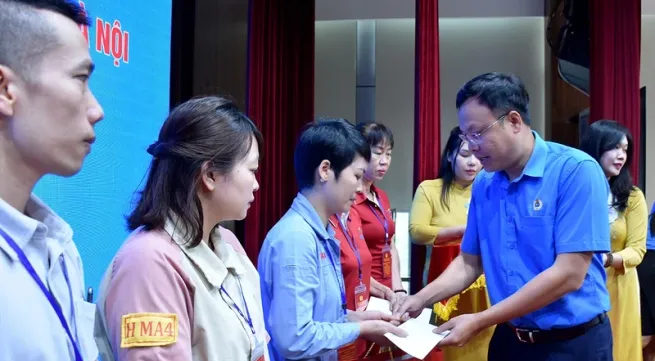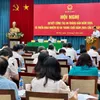Putting employees at the centre in developing policies and laws

As a people-centred nation for sustainable development, Vietnam always prioritises the well-being of workers. The 2013 Constitution asserts that the State encourages and creates conditions for organisations and individuals to generate employment for workers while protecting the lawful rights and interests of both workers and employers, as well as supporting the establishment of progressive, harmonious, and stable labour relations.
This principle has become a pervasive viewpoint in existing legal documents and has continued to be concretised in many recent draft laws. Notable among these are the amended Law on Social Insurance and the draft Law on Trade Union (amended). These are two legislative projects that have garnered significant public attention thanks to their direct relevance to the benefits that workers will enjoy.
During its 7th session, the 15th National Assembly (NA) officially passed the Law on Social Insurance (amended) with a high approval rate of 93.42% from participating deputies. At this session, NA Vice Chairwoman Nguyen Thi Thanh Thanh stated that greater efforts would be made to finalise the draft Law on Trade Union (amended) for submission to the NA for consideration and approval in the next session.
Thus, Vietnam's law system on labour has been continuously being improved to promptly meet the legitimate aspirations and concerns of workers, with the addition of many new provisions in the 2024 Law on Social Insurance, the draft Law on Trade Union (amended), and the upcoming draft Law on Employment (amended).
The 2024 Law on Social Insurance has added numerous beneficial provisions for workers, especially for citizens in vulnerable groups such as the poor, the near-poverty people, and workers in the informal sector. These regulations have helped expand the scope of social insurance coverage, enabling millions of people to access the advantages of this form of insurance. Notably, the 2024 Law on Social Insurance has adjusted the conditions related to retirement benefit eligibility from 20 years to 15 years.
The law also includes maternity benefits in the voluntary social insurance policy. This is a positive change impacting the decision of female workers in the informal sector to participate in voluntary social insurance, as statistics from 2019 showed that 67.2% of Vietnamese women are engaged in the labour market under this form.
Additionally, it has been assessed that the new Law on Social Insurance addresses the shortcomings and limitations of previous legal documents by adding several provisions aimed at raising awareness and responsibility regarding the rights and obligations of both workers and employers when participating in compulsory social insurance. This helps in preventing the fraudulent and exploitative behaviours and violations of social insurance regulations that have been occurring in some enterprises and production facilities across the country.
The draft Law on Trade Union (amended) is also viewed as a further step in concretising some progressive provisions that appeared in the 2019 Labour Code, aiming for partial compatibility with ILO Convention No.87 on the Freedom of Association and Protection of the Right to Organise (1948).
Specifically, the draft Law on Trade Union (amended) has introduced many new regulations based on the content concerning the organisations representing workers at the grassroots level, as stipulated in the 2019 Labour Code and Decision No. 174/QD-TLD issued by the Vietnam General Confederation of Labour on February 3, 2020, regarding the issuance of the Charter of the 12th Vietnam Trade Union.
From this foundation, the draft Law on Trade Union (amended) has provided a comprehensive definition of organisations representing workers at the grassroots level that it is an organisation established voluntarily by workers at an employment unit with the purpose of protecting the legitimate and legal rights and interests of workers in labour relations. The organisations representing workers at grassroots levels include grassroots trade unions and worker organisations at enterprises as stipulated by the Labour Code" (Clause 4, Article 4).
Compared to the current Law on Trade Union, Article 4 of the draft Law on Trade Union (amended) adds grassroots trade unions and workers’ organisations at enterprises alongside grassroots trade unions as legal representatives for workers. This provision gives workers more options for representative organisations to protect their legitimate and legal rights and interests at their employment units. Specifically, a grassroots trade union is a foundational organisation of the Vietnam Trade Union, gathering lawful freelance workers of the same trade, profession, or other specific workers, recognised by higher-level trade unions according to legal regulations and the Charter of the Vietnam Trade Union.
Workers’ organisations at enterprises are established and operate legally according to the law and exist independently from the Vietnam Trade Union. However, these organisations have the right to join the Vietnam Trade Union voluntarily if they agree with the Charter of the Vietnam Trade Union and their goals, organisation, and activities adhere to the Charter of the Vietnam Trade Union.
When joining the Vietnam Trade Union, the workers’ organisation at the enterprises are responsible for notifying the competent state management agency to revoke its registration and terminate its operations according to legal regulations. These provisions demonstrate that, in the spirit of the 1998 ILO Declaration on Fundamental Principles and Rights at Work, Vietnam respects, promotes, and implements some contents of Convention No. 87 even though it has not ratified this convention.
However, there are still certain individuals or groups claim to be "trade union activists," "independent trade unions," and try to deny these policies and laws. Recently, under the pretext of "protecting workers," these self-proclaimed activists and organisations have been distorting the 2024 Law on Social Insurance and the draft Law on Trade Union (amended). During the State’s process of drafting the 2024 Law on Social Insurance, they spread unfounded rumours such as "the pension fund will not be able to pay out by 2025," "the State is embezzling workers' pensions," "Vietnam Social Insurance's ineffective investments are causing fund deficits," "currency devaluation, inflation," etc., to incite people to withdraw their social insurance benefits in a lump sum. Meanwhile, this action will have long-term negative consequences for workers, as they will not receive pensions and other support benefits as stipulated by law.
Moreover, on some foreign newspapers and forums that are not friendly to the Party and the State of Vietnam, many articles and opinions have frequently called on workers to negotiate with businesses to not pay compulsory social insurance, arguing that insurance should be established on a "voluntary" basis. They make false accusations, such as claiming that the current social insurance contributions by employers are essentially deducted from workers' wages.
Therefore, they have speculatively argued that workers have full rights to use the money allocated for compulsory social insurance contributions. These individuals have also exaggerated the phenomenon of businesses evading or owing social insurance contributions to create unease among the people regarding this form of insurance.
By spreading misleading and confusing information about social insurance, these organisations have revealed their dark motives and subversive intentions. Their true aim is not to protect workers but to utilise this issue to form "independent trade unions," create trade union pluralism as a precursor to political pluralism, and ultimately establish opposition organisations to undermine and overthrow the leadership of the Communist Party and the regime.
For many years, certain parties have often exploited the fact that Vietnam has not yet ratified ILO Convention No. 87 to undermine the labour relations between enterprises and workers, and to diminish the role of the Vietnam General Confederation of Labour. This has led to demands for Vietnam to promptly ratify this convention and enact specific regulations on "independent trade unions". These entities deliberately overlook the fact that this convention is not mandatory for all ILO member countries to ratify. As of the current time, there are many countries that have not joined this convention due to various reasons.
Furthermore, even if Convention No. 87 were ratified, the position of the Vietnam General Confederation of Labour would not change. It remains a large socio-political organisation representing the working class and labourers that was established voluntarily. It is also a member within Vietnam's political system. This position of the Vietnam General Confederation of Labour has been achieved over the past 95 years of construction, struggle, operation, maturity, and development.
Therefore, the emergence of labour organisations in enterprises cannot carry the contrasting significance as claimed by self-proclaimed organisations above, but rather contributes to creating opportunities for the Vietnam General Confederation of Labour to continue its strong role among workers. Additionally, joining the Vietnam General Confederation of Labour helps organisations representing workers at the grassroots level contribute more strength to the labour movements nationwide and internationally, with the common goal of advancing social justice.
Based on the improvement of the legal framework on labour, Vietnam is demonstrating the determination to ensure sustainable employment, raise living standards, improve working conditions, and provide full access to basic social policies and services for workers across all regions of the country. These commendable results have strengthened the country's reputation internationally, while also affirming Vietnam's international commitments on labour and facilitating the integration process and participation in new-generation free trade agreements (FTAs).
Tags:





